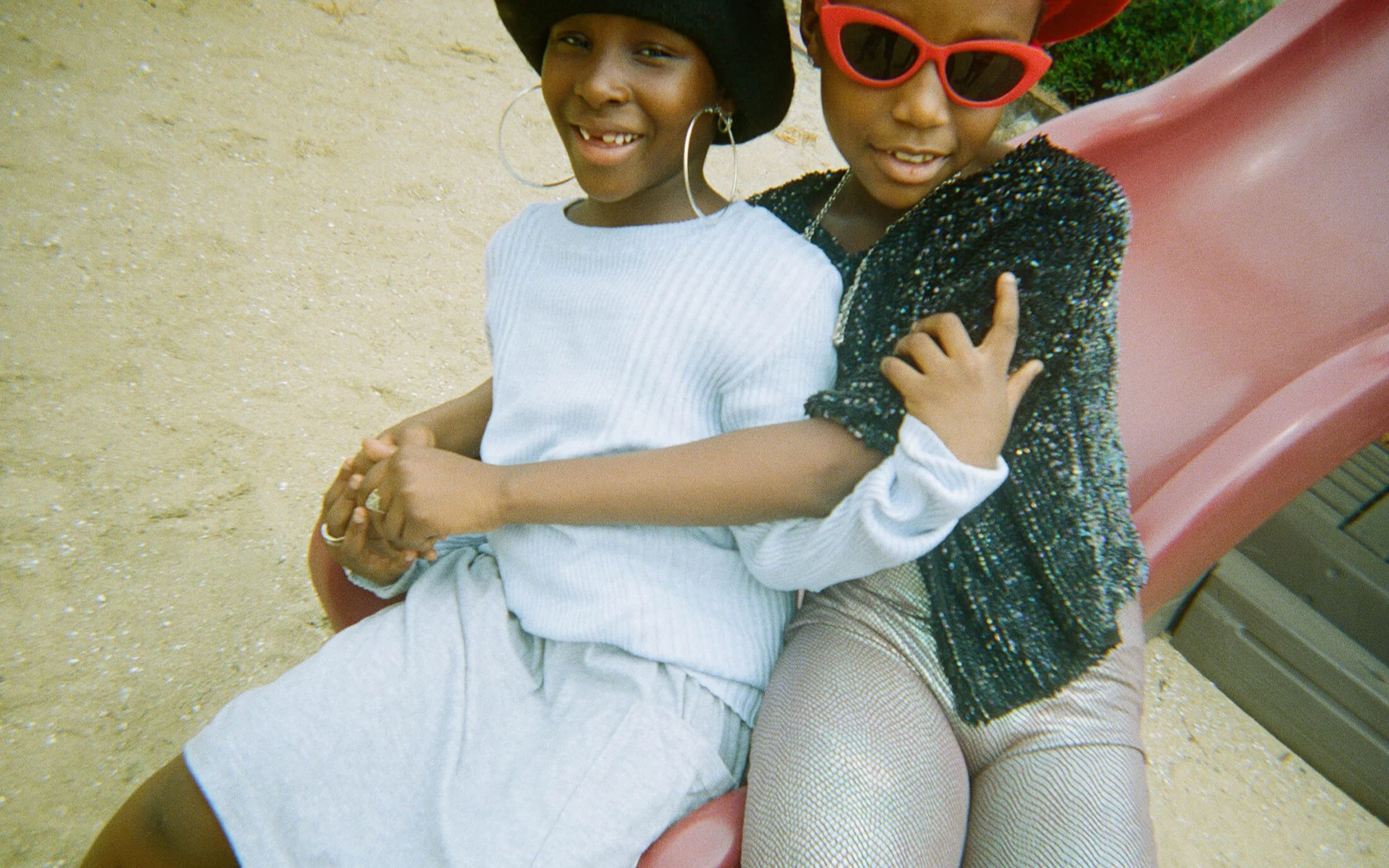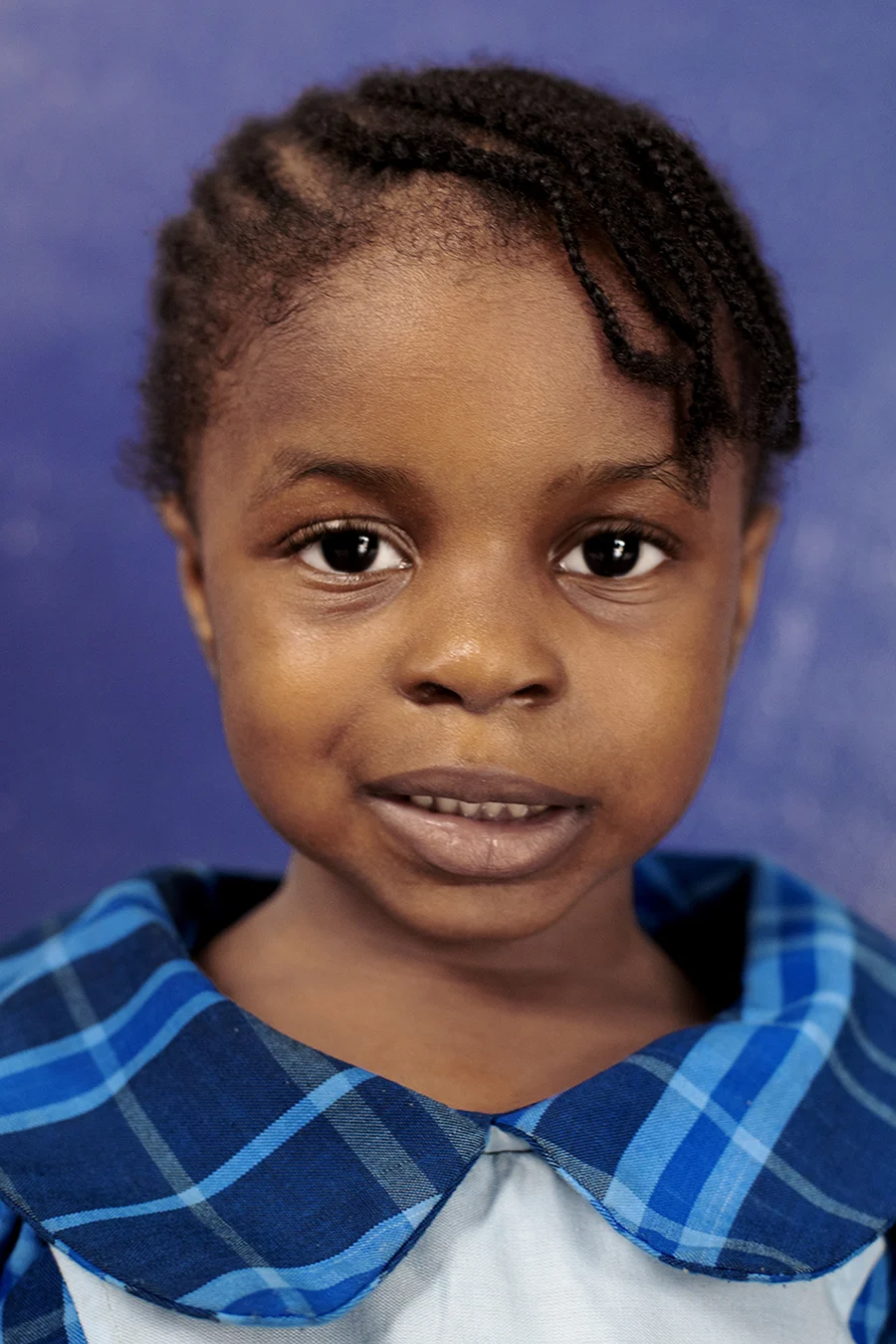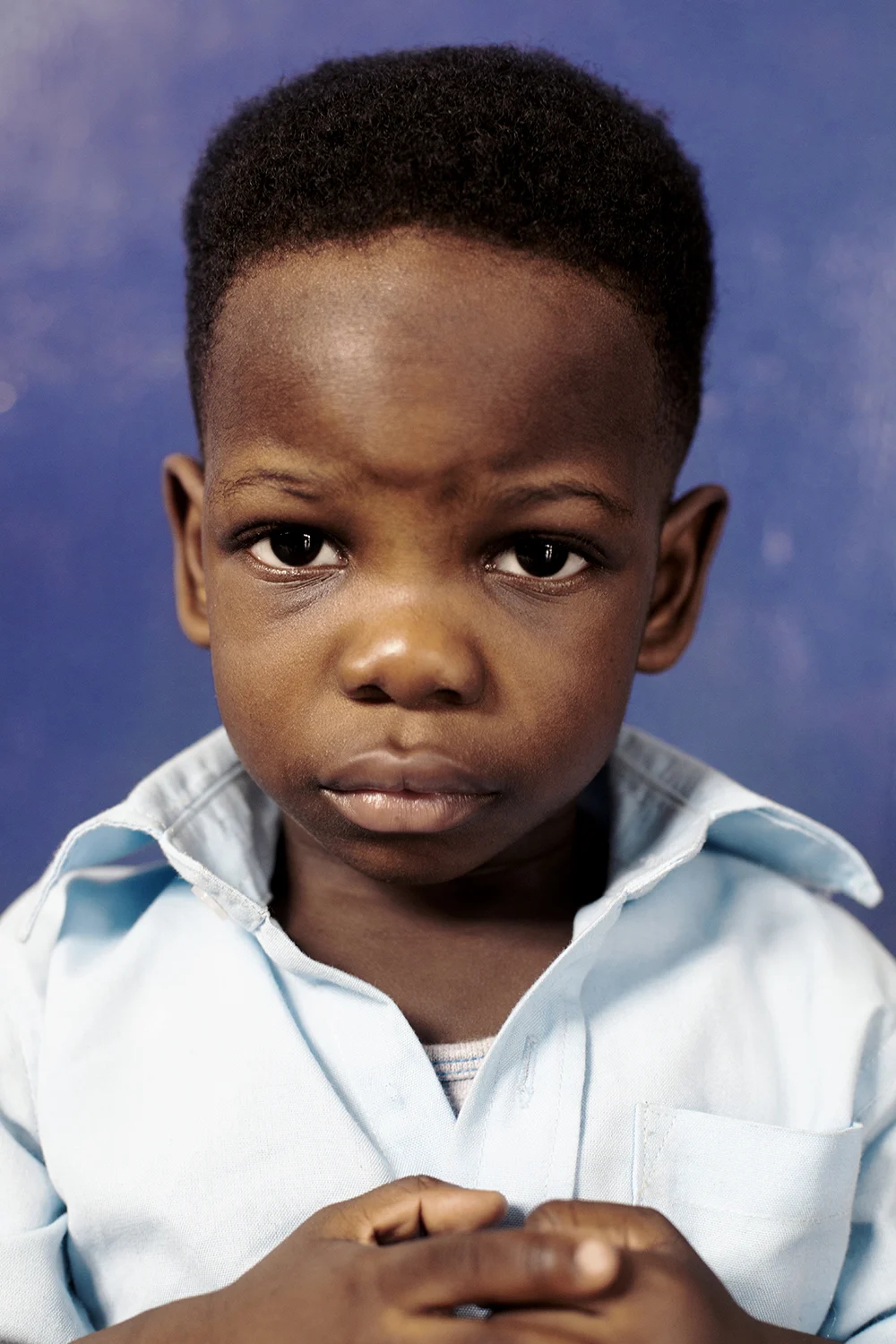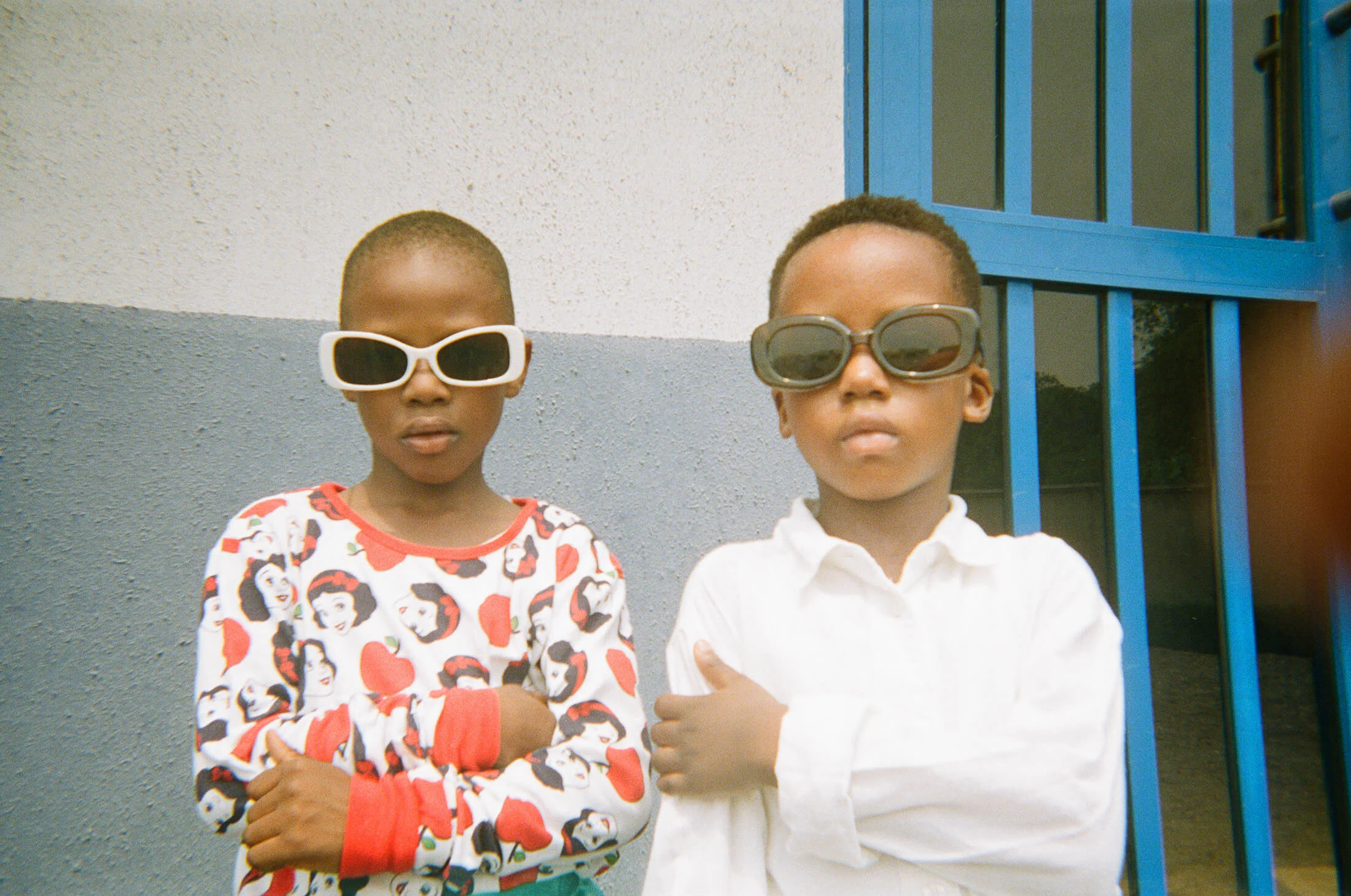

Having grown up in London but with roots and extended family in Surulere, Nigeria, the question “Where are you actually from?” has often been a difficult one to answer for photographer Rubee Samuel. For her project “Omo Nigeria,” she traveled to Surulere—a place she’s rarely visited but always seen as home—to give creative workshops to young students. She tells writer Diane Smyth how she ended up trying to capture the childhood, and the school portraits, she never had.
Surulere is a busy residential neighborhood in Lagos, Nigeria, home to parks, cocktail bars and Rubee Samuel’s extended family. Rubee also describes it as home and has a tattoo of its coordinates but, though she visited as a child, she didn’t grow up there. Her childhood was in Olympia, West London, with Nigerian parents. “All my mum's sisters live in West London, so I grew up with my cousins and Aunties and in that respect, I had a Nigerian upbringing,” she says. “But Olympia isn’t ethnically diverse. I was one of two Black girls in my friendship group.”
“I am British. I was born and raised in Britain, but then people ask me ‘Where are you actually from?’ and I feel I’m not British after all,” she continues. “If I go to Nigeria, they see me as British because I can’t speak Yoruba fluently and I dress a certain way, and that can make me look like a tourist. Sometimes I think I’m in limbo.”


It’s a rich but complicated inheritance, and one that bubbled up when Rubee went back to Surulere in 2019 to lead a photography workshop in two primary schools. Originally the plan was simple: to give the children a taste of a creative subject not typically taught in Nigeria, but once there she found herself pondering her own childhood, and what it would have been like in Surulere. “These are the school portraits that were never taken of me; these were the classmates that I never had,” she writes in her book on the project, which she’s titled “Omo Nigeria” or “Children of Nigeria.”
Her book combines her portraits with images from the workshops, a poem by British Nigerian author Jolade Olusanya, a text by British Nigerian journalist Kelechi Okafor, a transcript of a conversation with her mother, and reflections on running the project. It’s a deeply personal take but it’s also an insight into the children, because the shots from the workshop were conceived of and taken by them. There are also images of Rubee’s late uncle, shown in passport photographs that suggest the questions of identity running through Omo Nigeria.

Rubee set up and funded the photography workshops herself and spent two days in each institution, teaching children aged four to six in the first and eight to 11 in the second but taking roughly the same approach with both. First she talked with the kids about photography and asked them to write a story, then they picked out costumes and props, and styled, modeled, and photographed their narratives.
Their stories are also included in “Omo Nigeria” and they’re both cute and intriguing, varying from mythical tales of bad kings to wise farmers, accounts of a first day at school to a trip to the cinema. Like the passport images or Rubee’s portraits, the stories suggest questions of identity and how it can be shaped and formed, as well as the power of images. “As we entered the cinema we were cold and hungry, but watching the cartoon got us away from our hunger situation,” reads one.
These are the school portraits that were never taken of me; these were the classmates I never had.




Early exposure to the arts is vital to building the next generation of Nigerian creatives and image-makers.
Rubee hadn’t originally intended to photograph the children but, urged to do so by the staff at the first school, found the experience compelling and thought-provoking. These images are technically sophisticated but stylistically modest, modeled on the portraits shot in schools the world over, and by including them Rubee suggests a deeper reading of images often written off as naive.
Rubee picked out images to show the kids in her workshops. Studio photography has a distinguished history in Africa and wedding photographers are highly prized in Nigeria, she says, but fashion photography is seldom seen as a viable career; she selected street fashion stories, shot by image-makers such as Nadine Ijewere, a Londoner of Nigerian-Jamaican heritage, and Steven Tayo, who’s based in Lagos. “I made sure they were either Nigerian or of African heritage so that the kids could be like, ‘Oh that person looks just like me, so actually it can be me. If that person is successful, I can do it too’,” she explains.

It was part of a very practical impetus behind the workshops, to promote the idea of a career in the creative industries. Nigerian primary schools typically focus on core subjects such as maths, English, and science, Rubee explains in Omo Nigeria; art isn’t generally taught, and a career in the arts is often not considered credible. “I believe that early exposure to the arts is vital to building the next generation of Nigerian creatives and image-makers,” she writes.
Rubee originally got into photography through fashion, inspired by watching America’s Next Top Model with her mother; after leaving school she found work in a studio in West London, and learnt her skills on the job. Since then her photography has evolved towards documentary and portraiture, shown in galleries such as Ronan Mckenzsie’s artist-run space in London, Home. But she says fashion was essential in helping her get started, and in envisaging both a creative career and a sense of her own identity. Rubee says she was fortunate to have parents who supported her, but she’s also been brave, following her dreams and carving out her own path.


She’s published Omo Nigeria through a company called Twentyfour Thirtysix, which she set up with creative director Shiraz Randeria; they aim to showcase projects by visual artists from or with heritage from the tropics and the sub-tropics, who are traditionally underrepresented in the arts. “The publishing industry is heavily white-dominated and with that comes a level of prestige,” she explains. “As a creative who is self-taught, or with not as much formal education, sometimes it's hard to find a place within that. We're hoping to offer a space for people from the diaspora or outside the West, so they can publish their work and have the confidence that people want to see it, that they are good enough essentially.”
Twentyfour Thirtysix will also offer practical help, covering production costs and sharing profits with artists plus donating funds to further educational workshops and grassroots projects. It’s a proactive approach to widening creative possibilities, by an image-maker who has had to find her own way. “I spent a lot of my life being told about my life,” she writes in Omo Nigeria. “Everyone ‘knew’ my story before I even got the chance to write it.”
Order the book on the 24˚36˚ website.

